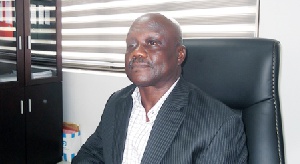- Home - News
- TWI News | TV
- Polls
- Year In Review
- News Archive
- Crime & Punishment
- Politics
- Regional
- Editorial
- Health
- Ghanaians Abroad
- Tabloid
- Africa
- Religion
- Election 2020
- Coronavirus
- News Videos | TV
- Photo Archives
- News Headlines
- Press Release
Business News of Thursday, 24 March 2016
Source: thefinderonline.com
Thermal power cannot solve ‘dumsor’ - IFS
The Institute of Fiscal Studies (IFS) has intensified its calls for government to rely on renewable energy to solve the perennial energy crisis saying renewable energy is the best alternative to low cost power generation in Ghana rather than the expensive thermal power which has escalated electricity bills.
Government has resorted to thermal plants including those from Karpower and AMERI to solve the power outage popularly called ‘dumsor’ but these interventions have rather escalated electricity tariffs by more than 100 percent.
According to the economic Think Tank, renewable energy is the future for global electricity generation to meet the growing demand of electricity and therefore thermal power cannot solve the energy crisis.
“Indeed, in countries such as Ghana where power outages from fossil fuels have become a serious constraint on economic growth, renewable energy provides a perfect substitute”.
Explaining further, it said “relative to conventional power generation projects, investments in renewable energy usually have high upfront capital costs and commercial risks as well as longer investment” recovery.”
It therefore urged government to support renewable energy investors s adding “the government can use a variety of incentives to encourage private investments in renewable energy. Fiscal support instruments such as tax and non-tax incentives that lower the costs of doing business are the most common ones that can be employed.”
The economic think tank noted that subsidies and rebates can also be provided to buy down the initial capital cost of the system so that consumers can enjoy lower prices.
“Equipment rebates can be provided to target specific types of renewable energy technology. Direct equipment sales programs also allow consumers to buy or lease renewable energy systems directly from manufacturers at below-retail rates.” Many countries including Japan, USA, Australia and Germany offer rebate programs to promote installation of renewable energy systems.
IFS also called for investment tax credit, production tax credit for investors that want to venture into renewable energy.
It also called for financial incentives in the form of investment grants, subsidized loans, loan guarantees, and insurance at preferential rates for the potential producers
More than 25 developing countries have put renewable energy targets in place, including 13 African countries. These countries have acknowledged the importance of energy targets in national development and poverty reduction plans.
However, despite political support and endorsement, some of these countries have to date failed to put in place the supportive policies needed to create the level playing field. IFS said without these policies and incentives, investors and independent power producers will continue to place emphasis on conventional energy options.
According to KPMG, global demand for electricity is expected to rise by more than 80 percent from 2010 to 2040, driven by increases in population and GDP.
Approximately 20 percent of global electricity generation now comes from renewable energy sources. Renewables accounted for over half of total net additions to electricity generating capacity worldwide in 2012.
Energy generation from renewables is expected to increase by almost three times its 2010 level in 2035, with the share in energy generation mix increasing to 31 per cent.
Ghana’s electricity peak demand (including suppressed demand) and total transmission system peak is between 1,980-2,300 MW. However, with the rapid population and the expected industrialization, electricity demand will grow rapidly.











